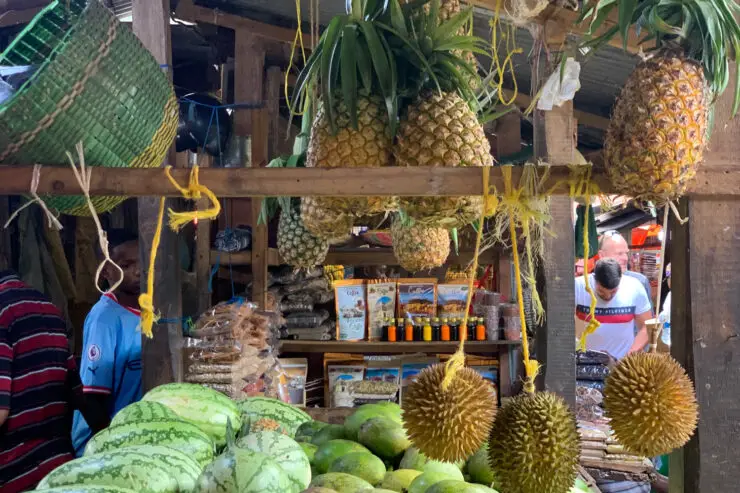As an Amazon Associate I earn from qualifying purchases. Please read the disclaimer for more info.
Ahhh, Zanzibar, the tropical paradise located in the Indian Ocean with its powdery white sands, crystal blue waters, and tropical fruits in abundance.
From delicious fruit platters for breakfast, and fruit carts located on every corner, to an extensive range of fruit juices, the fruits in Zanzibar provided a refreshing experience for our time on this tropical island.
Whether traveling through the markets or local villages, sampling some of these unique fruits, especially straight from the fruit trees, is one of life’s most delightful experiences and should not be missed while visiting the island.
So, hop onto your hammock, pour a mango juice, and let’s look at the top 20 Zanzibar fruits to try on your next trip to this tropical getaway.
Related: Zanzibar Travel Guide – Everything You Need to Know
Related: Zanzibar Food: Street Food to Tropical Fruits
Top 20 Zanzibar Fruits
Bungo Fruit
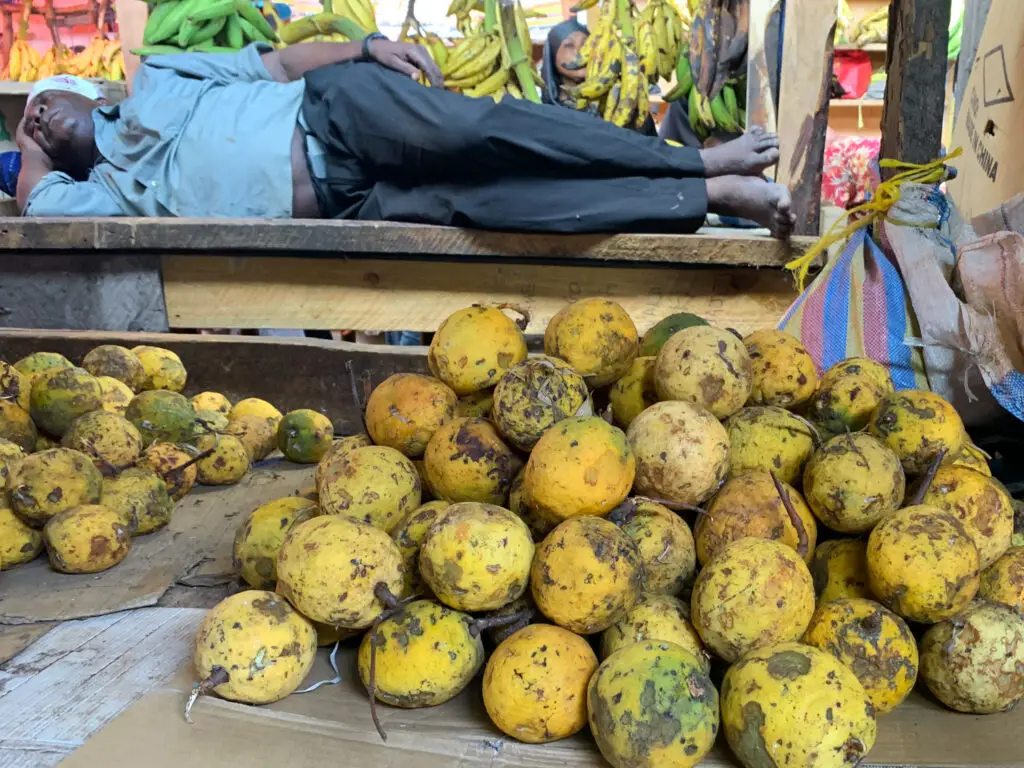
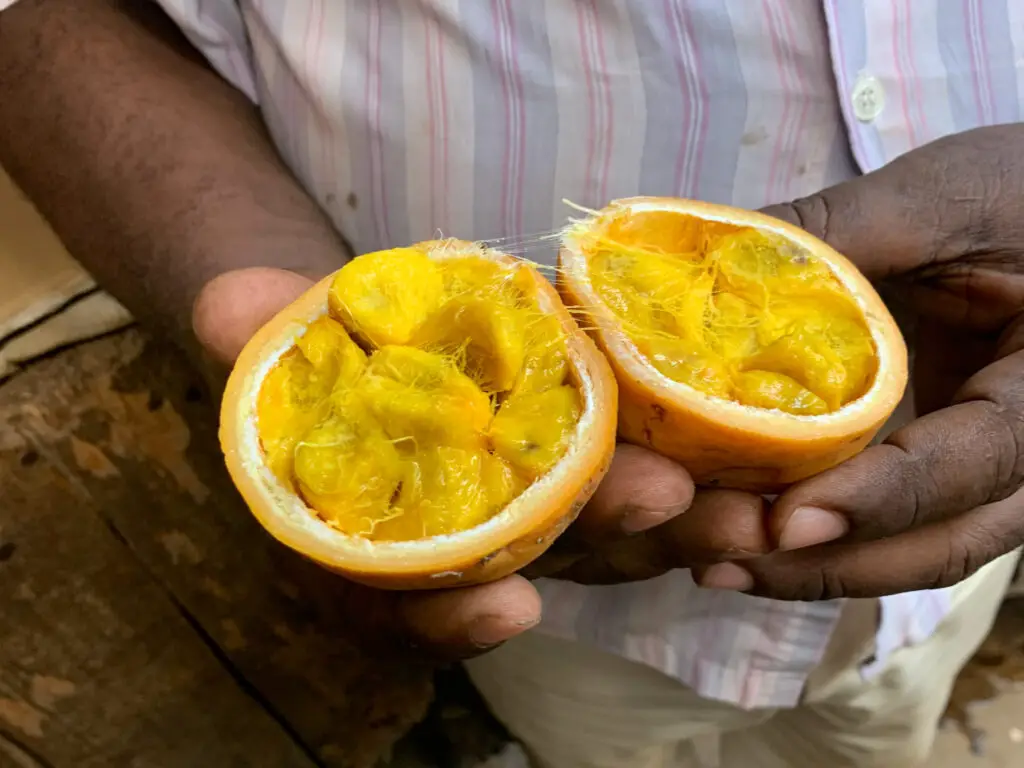
Walking through the fruit section of Stone Town market, bungo fruit was the first fruit we came across that we didn’t recognise. We spoke to the vendor who kindly opened one up for us to try.
The exterior of the fruit is covered in a thick, fuzzy peach-colored skin. Once he sliced the bungo fruit in half, the inside revealed a flesh that is soft and gel-like with a consistency not too dissimilar from a finely textured panna cotta.
The color of the flesh is a deep orange and it is dotted with small black seeds. When eaten, the Bungo fruit is a delicate balance of sweetness and tartness that lingers on the tongue long after the fruit is gone.
Related: Zanzibar Food – Street Food to Tropical Fruits
Durian
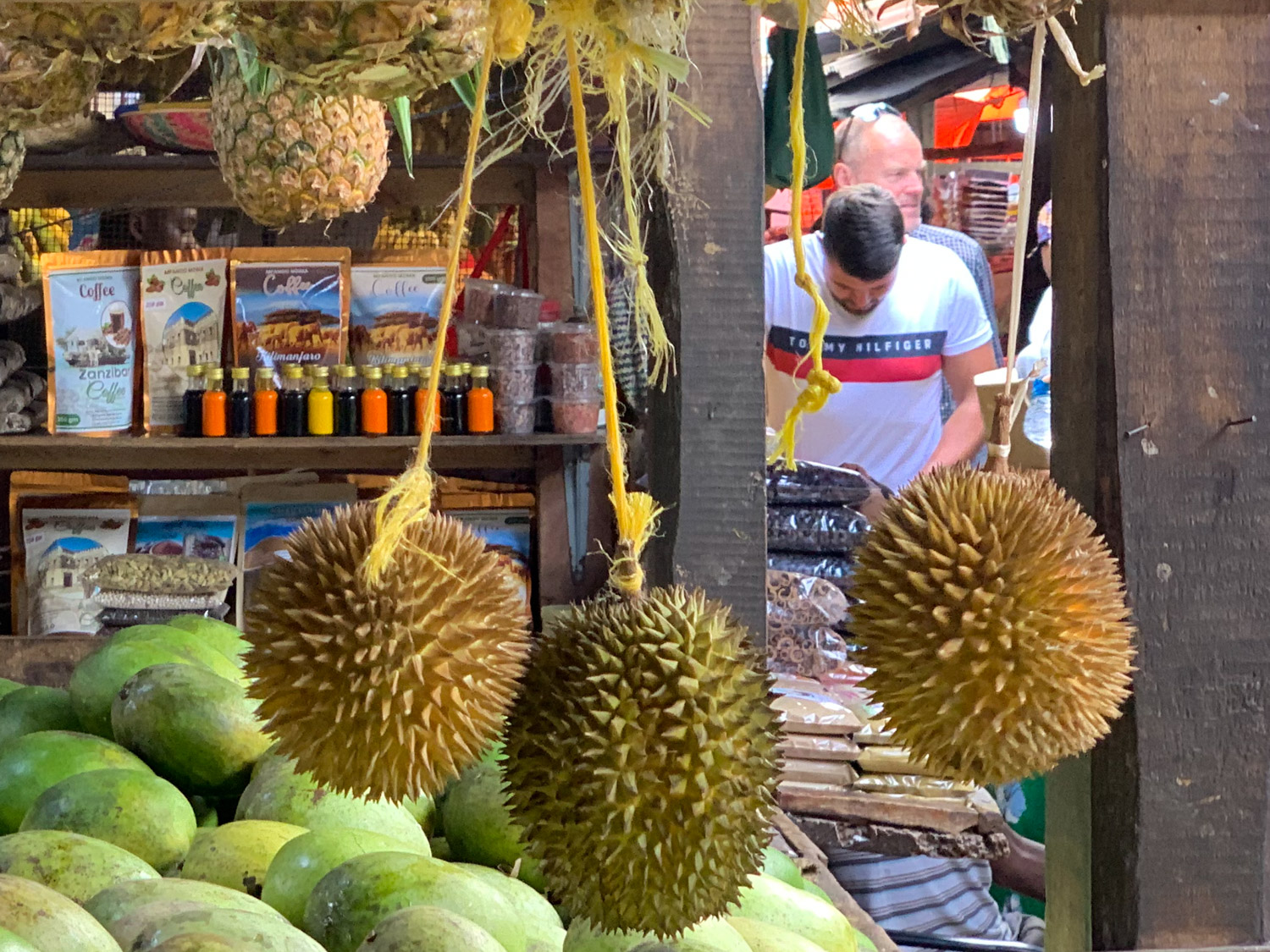
Durian fruit is one of the most unique-tasting tropical fruits in the world. Its thick, spiky husk stands out from a crowd and its pungent smell prohibits taking it into hotels wherever it can be bought.
Inside is a creamy and succulent treat that leaves an unmistakable impression on your taste buds. The creamy texture is incredibly smooth and has hints of sweetness hidden throughout, balanced perfectly with a kick of savoriness in the background.
Zanzibar durian are smaller than their Asian counterparts.
Baobab
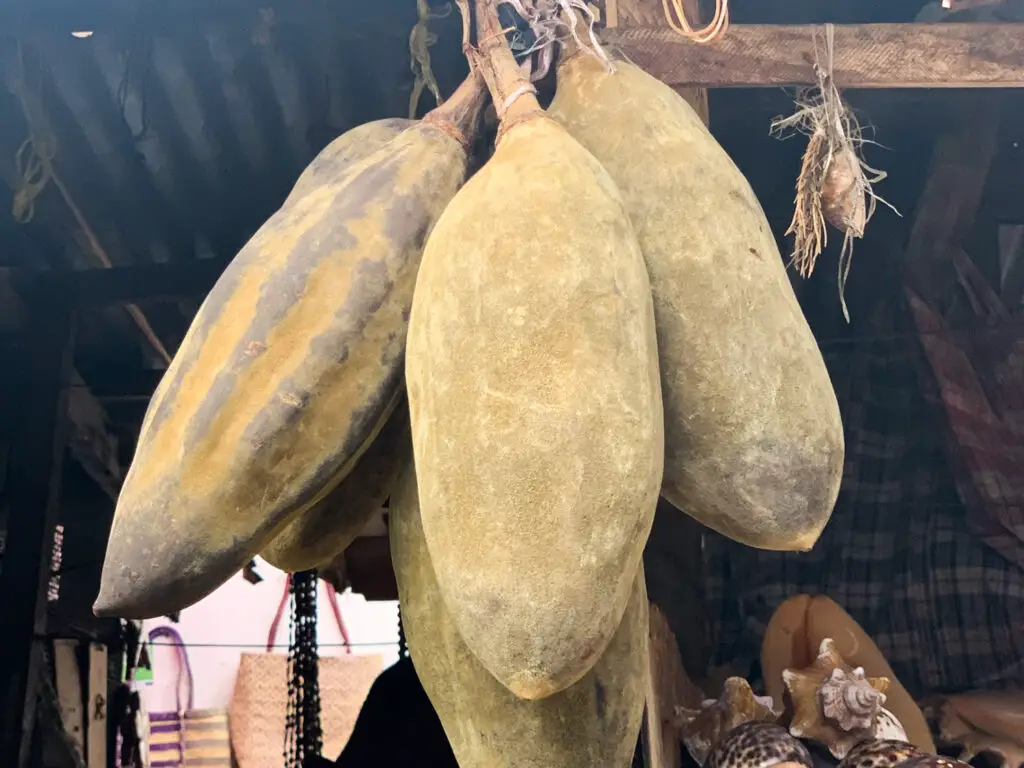
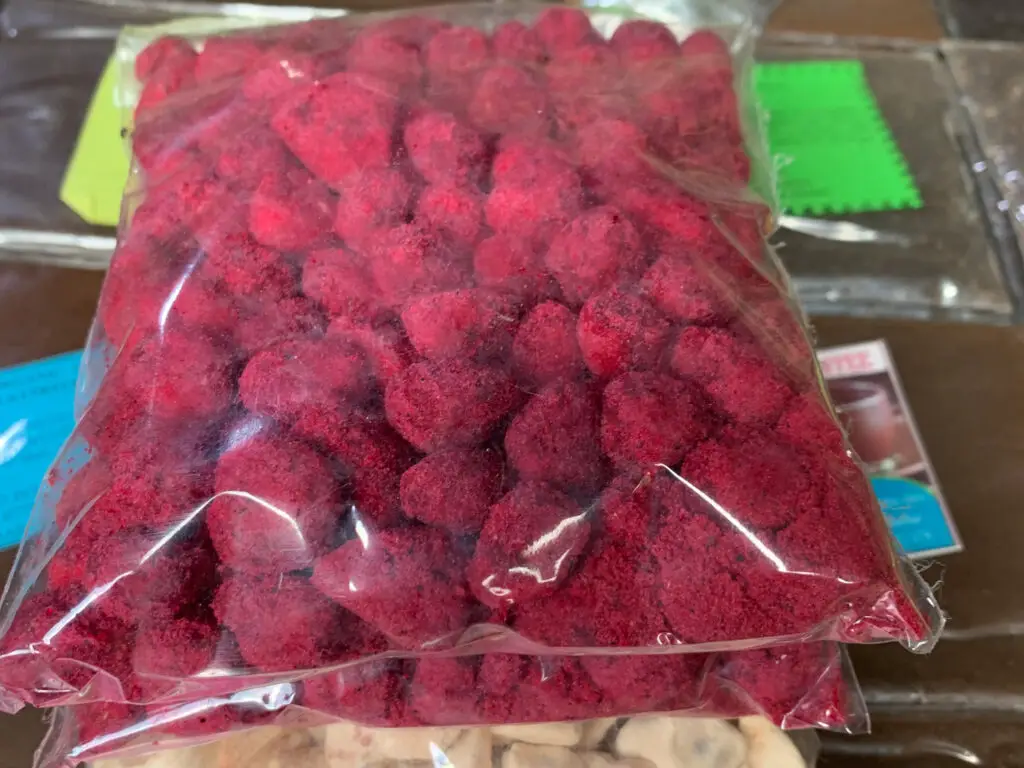
Baobab fruit is a versatile fruit that can be used to make medicinal and culinary concoctions. It has plenty of health benefits and due to its slightly tart taste, it can be used to create a refreshingly tangy drink or added to smoothies for a tropical flavor.
Baobab powder is also consumed as a dietary supplement.
Our favorite way to consume this exotic fruit was as a candy, where the seed is boiled and coated with a blend of sugar, salt, black pepper, cardamom & vanilla.
Passion Fruit
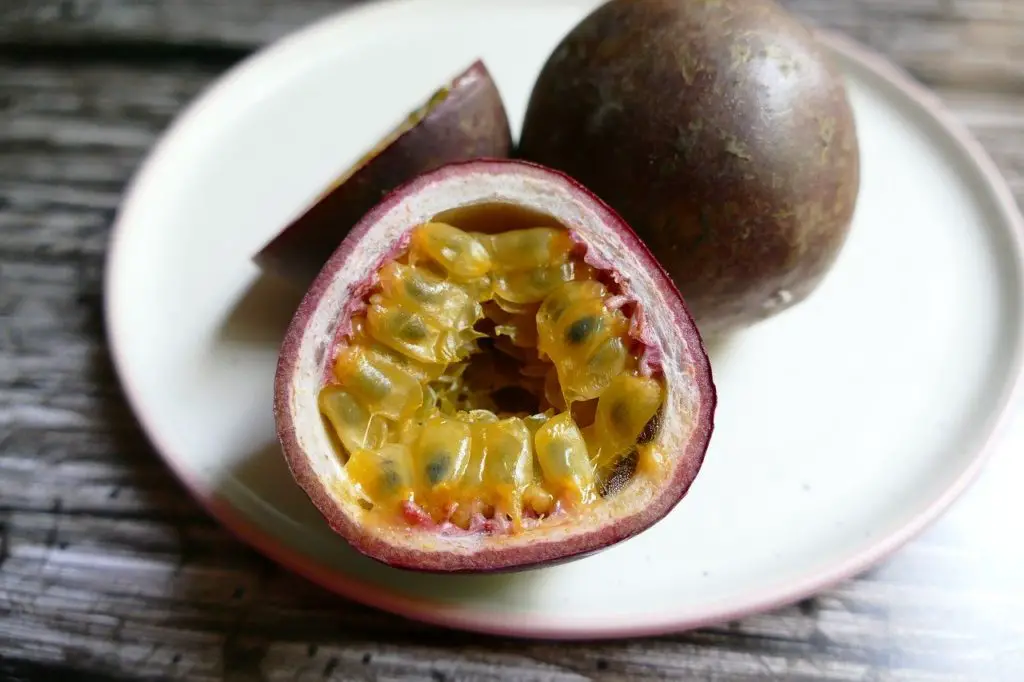
Passion fruit was a staple of breakfast platters all over the island. Whether simply cut in half and consumed with a spoon, seeds removed from the case and mixed in with a fruit salad, or made into a juice, this fruit was a favorite during our time in Zanzibar.
Jackfruit

My favorite jackfruit experience in Zanzibar was in the fishing village of Nungwi. Under a large tree, the vendor had set up ‘shop’ where he was selling slices of jackfruit for a dollar a piece. Of course, we bought our slice and enjoyed the fresh taste and the meat-like texture. The seeds can be included in curries.
Bananas
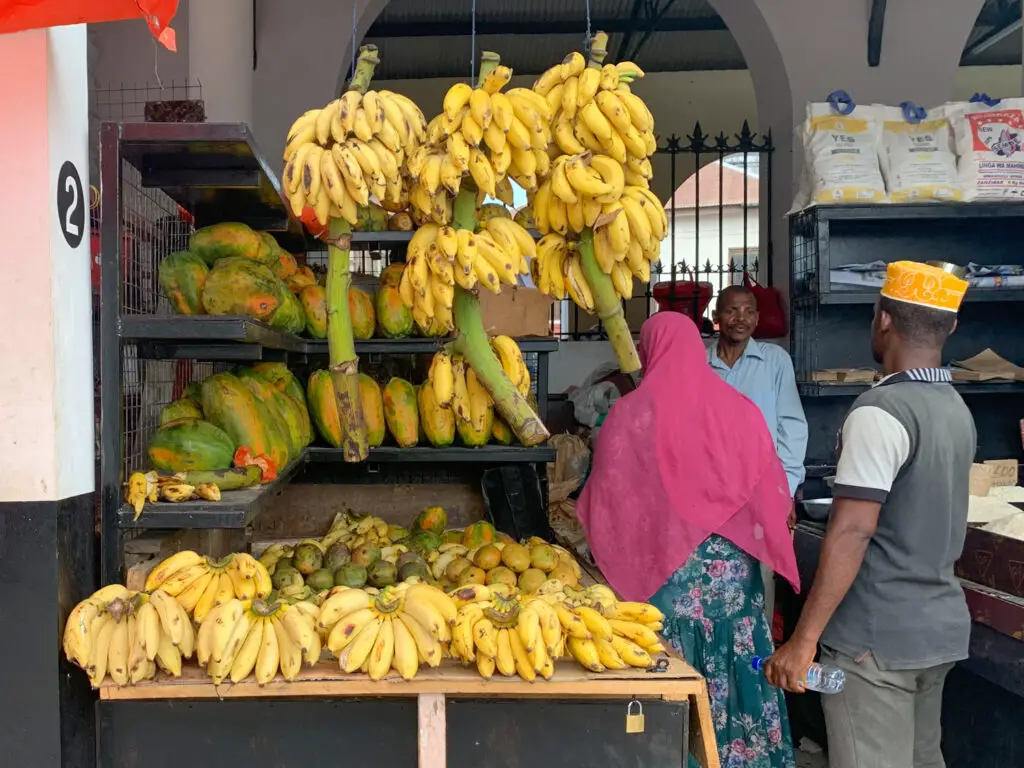
Along the winding roads of Zanzibar, banana trees, along with coconut palms, is an ever-present sight.
Mangoes

Zanzibar produces a variety of mangoes, which are then processed into jams, and juices, or are just eaten as is straight from the tree. Mangoes are another breakfast fruit platter staple, whether sliced and/or served as mango juice.
Coconuts
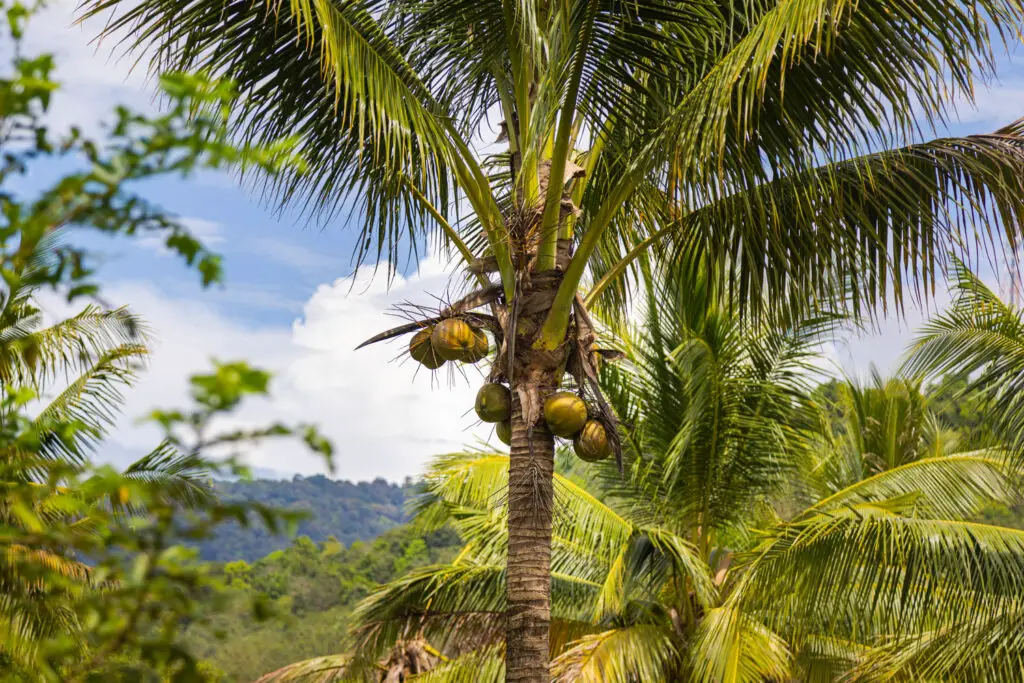
Coconuts are grown all over Zanzibar, and similar to banana trees, are an ever-present part of the landscape. We enjoyed them young when they are opened up for their juice, as well as a bit older when we enjoyed the white flesh inside.
And who could forget the perfect island drink – the pina colada with coconut milk and pineapple, and a generous dash of rum.
Avocado
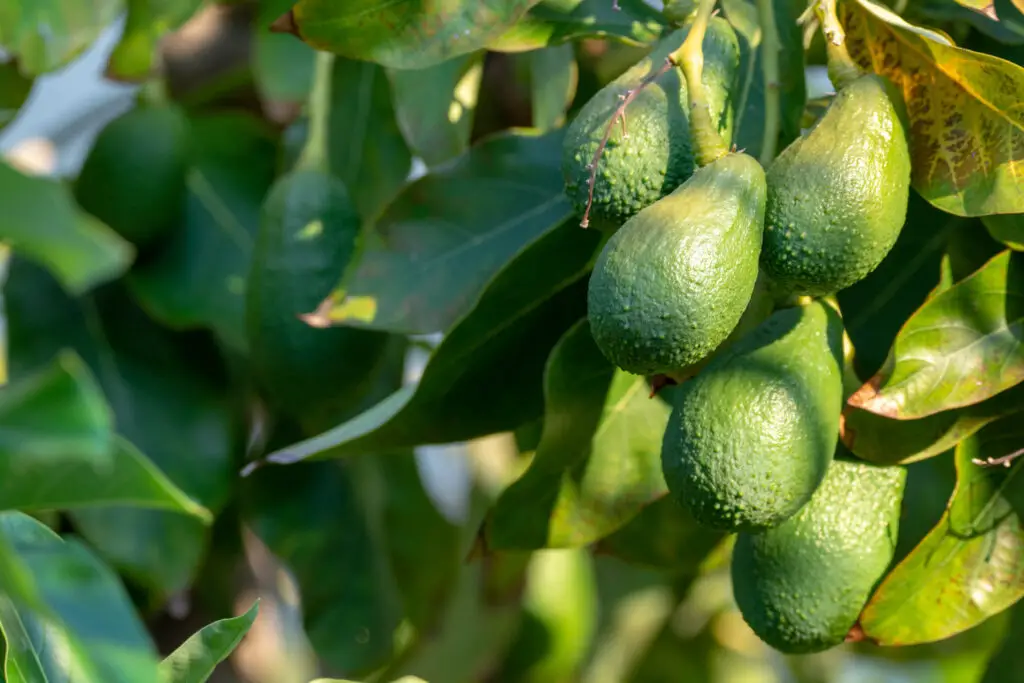
One of the enduring fruit-related memories of our time in Zanzibar, and the wider Tanazinia, was the proliferation of avocado trees on the streets. Of course, they made for a beautiful addition to the landscape, but the trees always seemed to be full of fruit, and the locals seemed disinterested in picking the ripe ones and were often bemused when we would stop at a tree to marvel at the sheer volume of avocados ready to be picked. Maybe being from a country where avocados are sold as a premium fruit may have contributed to our interest.
Papaya
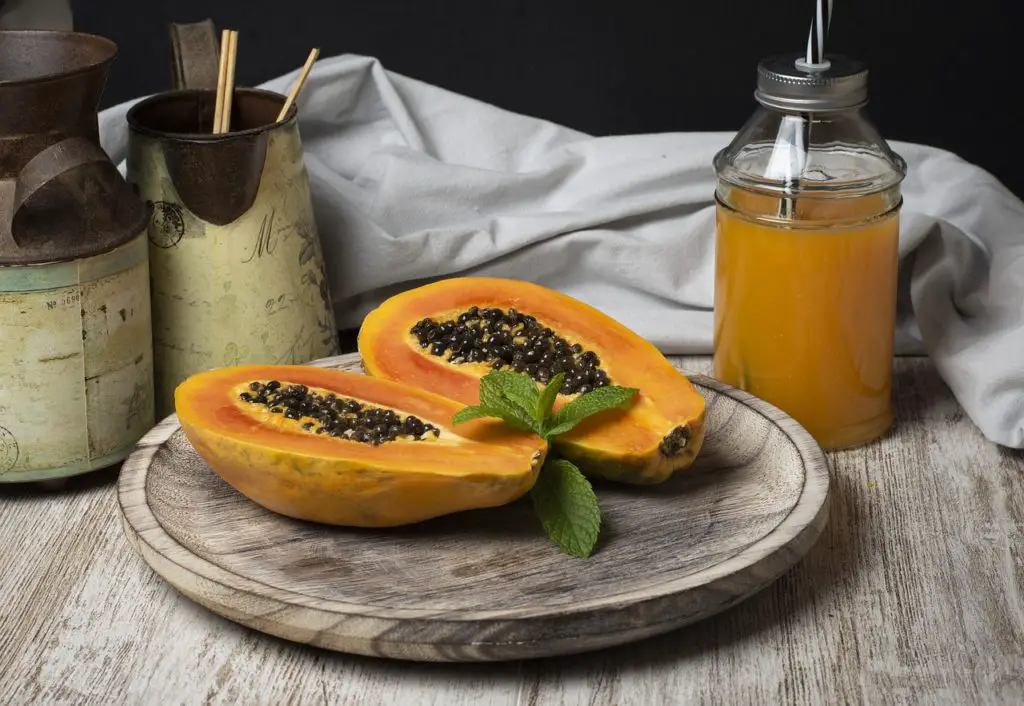
Papayas have an incredibly mild and sweet flavor, which complements almost any ingredient they may cross your plate with. Whether in a smoothie, salad or simply just sliced and plain, papayas provide an incredibly refreshing start to the day.
Pineapple
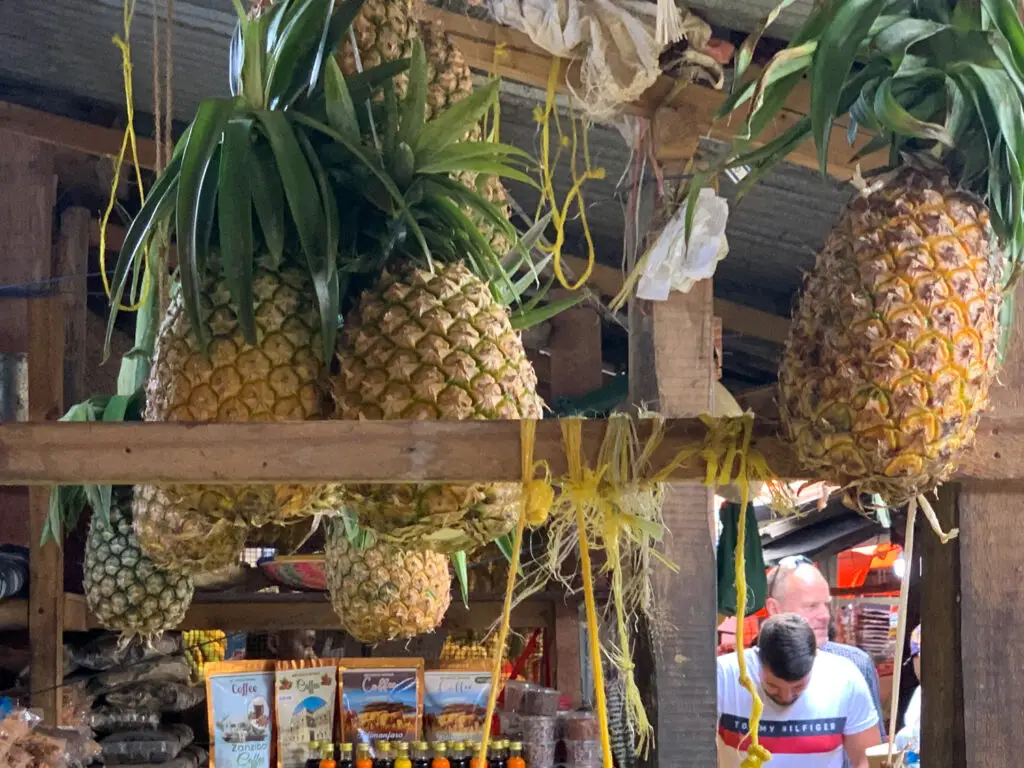
Pineapples are another staple for breakfast fruit platters across the island. We also enjoyed the sweet and juicy fruit as a grilled prawn and pineapple salad as a starter at a special restaurant overlooking the Indian ocean one evening.
Soursop
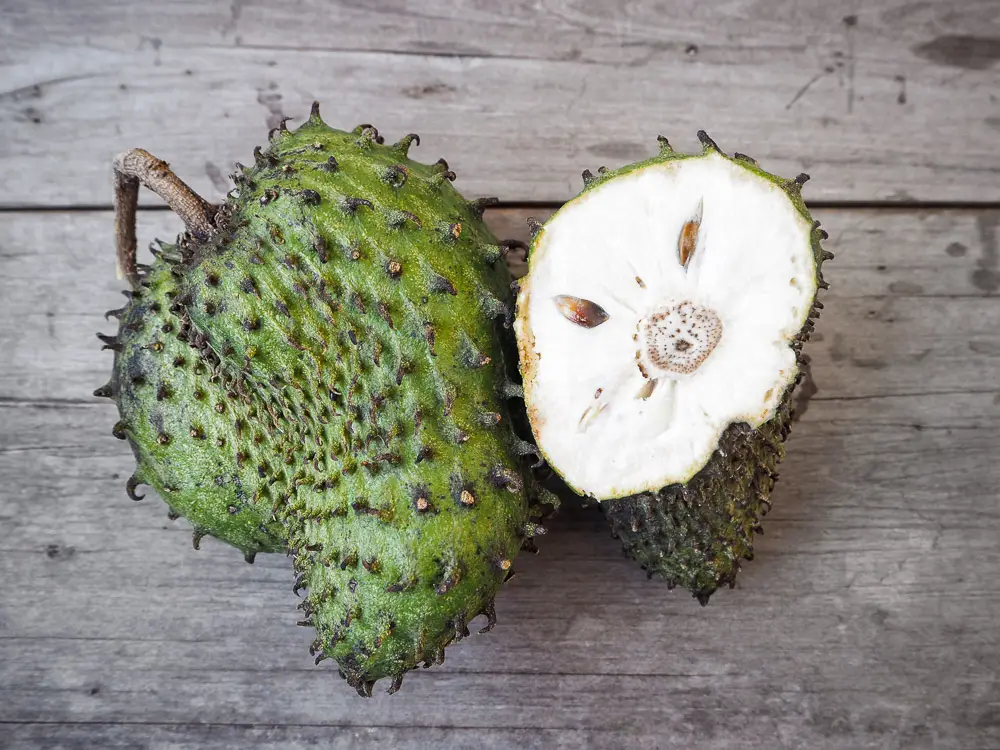
I love soursop and was happy when we came across it at the market. The fruit has a creamy, smooth flesh and is bursting with tart and tangy flavor, complimented by a hint of sweetness.
Guava
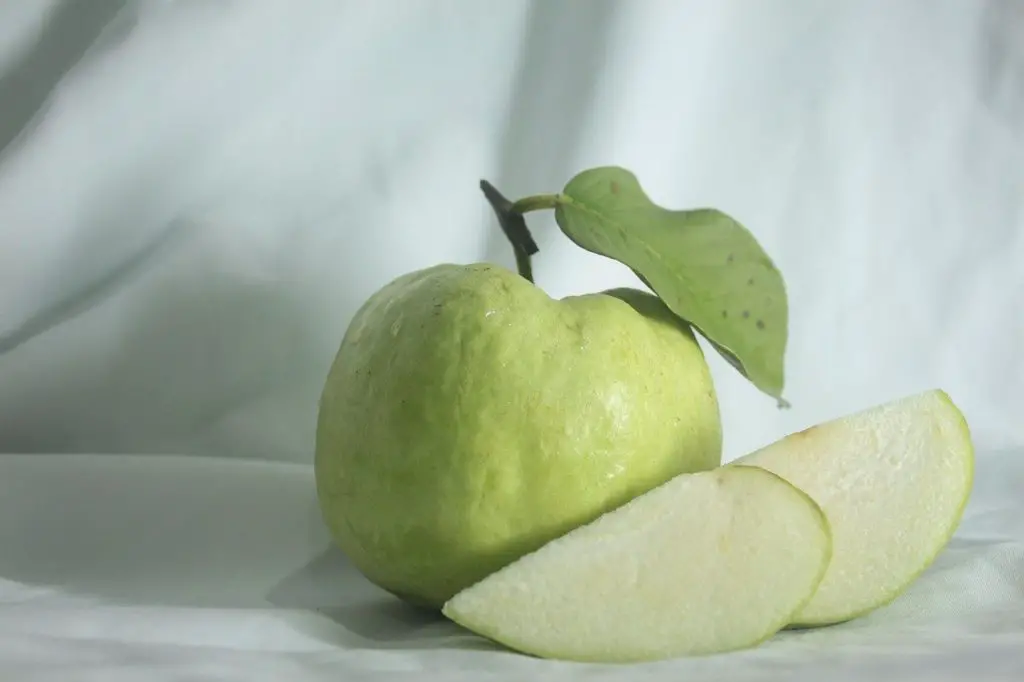
Guavas grown in Zanzibar have a distinct and sweet taste, sometimes described as a combination between a pear and a strawberry. We enjoy the crunchy yet creamy textures of guavas with our homemade chili salt (Muoi Ot).
Watermelon
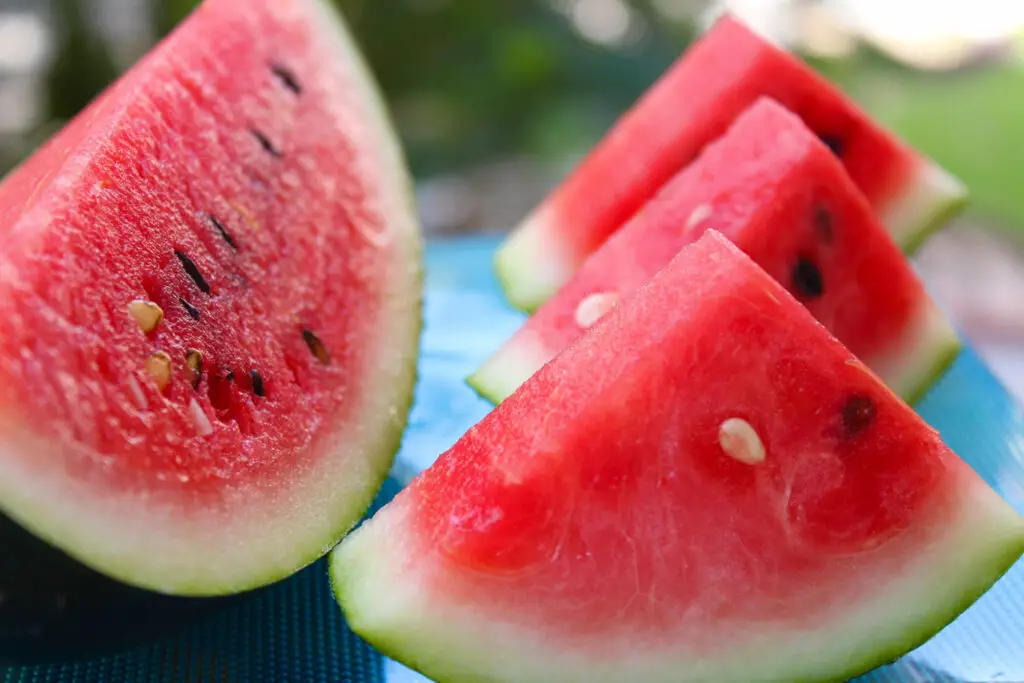
No tropical island would be complete without watermelon. The perfect cooling snack to enjoy after getting a little too much sun on Kiwengwa beach. Or maybe a watermelon and lychee cocktail.
Related: Fruits that start with W
Rambutan
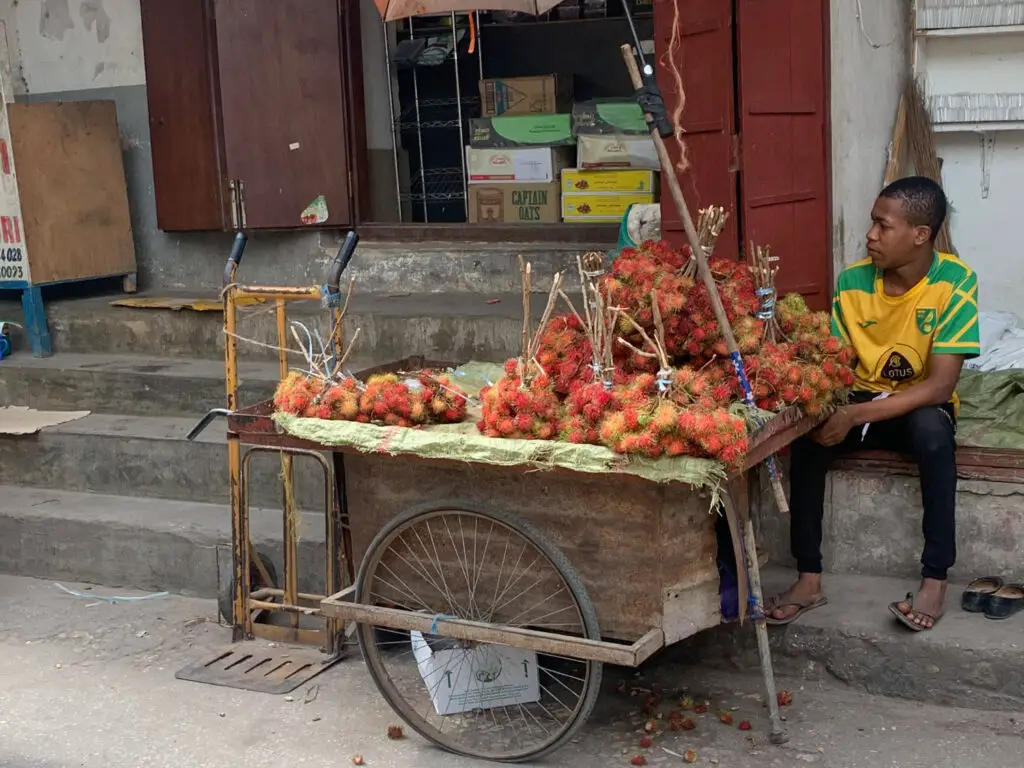
I was quite amazed to find rambutan, a fruit native to Southeast Asia, available in abundance at Stone Town market. It was an unexpected surprise for me as it’s not usual for exotic fruits like these to be found so far from their native lands.
Naturally, we purchased some and enjoyed them for a day or two as a little ‘taste of home’ stack.
Pear
Growing pears in Zanzibar can be difficult due to the hot, dry climate and lack of rainfall. The very few pear trees that do exist in this region are usually confined to small orchards and often produce small, less sweet fruit.
Pomelo
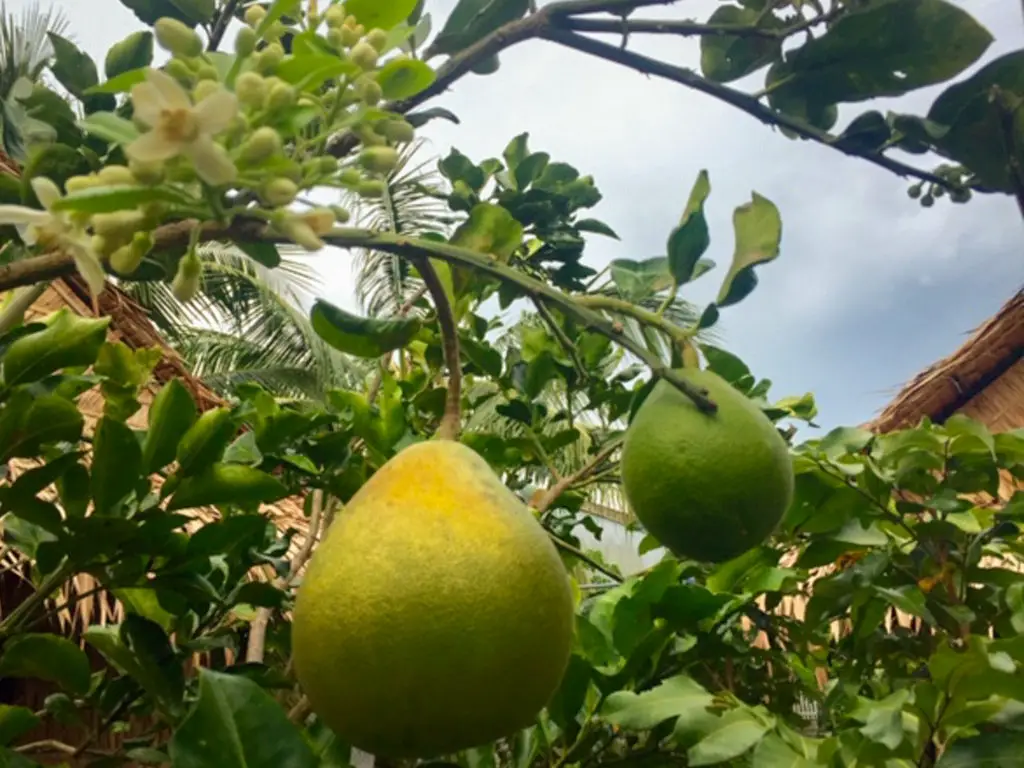
The pomelo is an exotic citrus fruit that has a unique flavor. It tastes similar to a grapefruit but has less bitterness and more sweetness.
Mangosteen
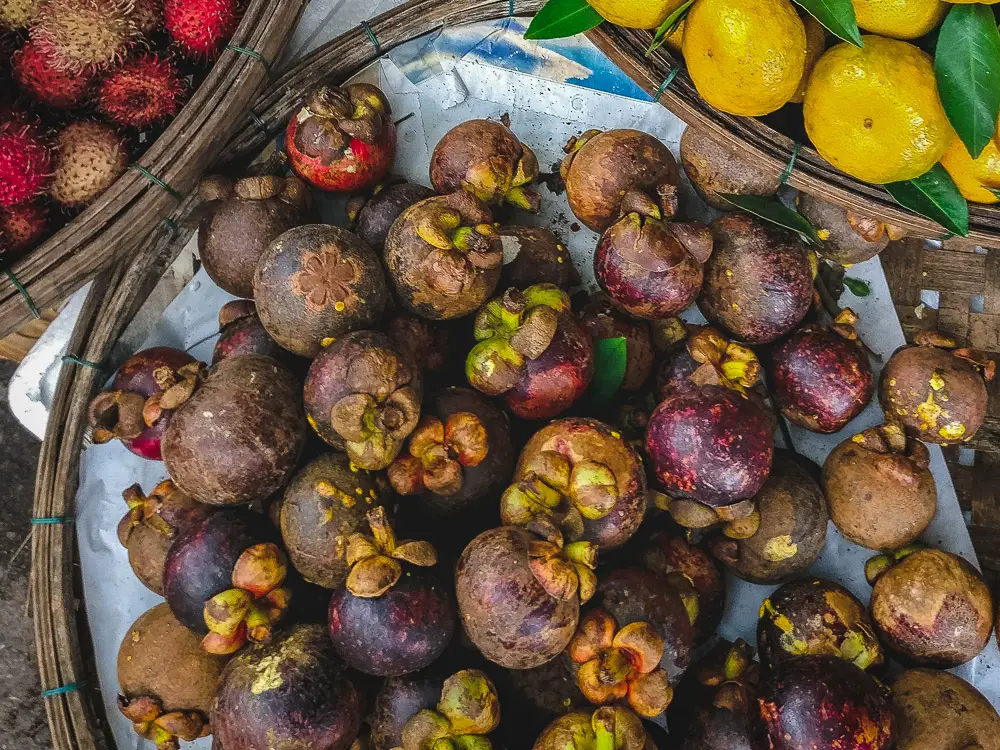
Mangosteen has a unique purple exterior and a wonderfully sweet and tangy flavor. The inner white flesh is one of the best fruit experiences, and I always eat too many. Mangosteen can be found at any of the larger markets, as well as the odd street vendor cart.
Dates
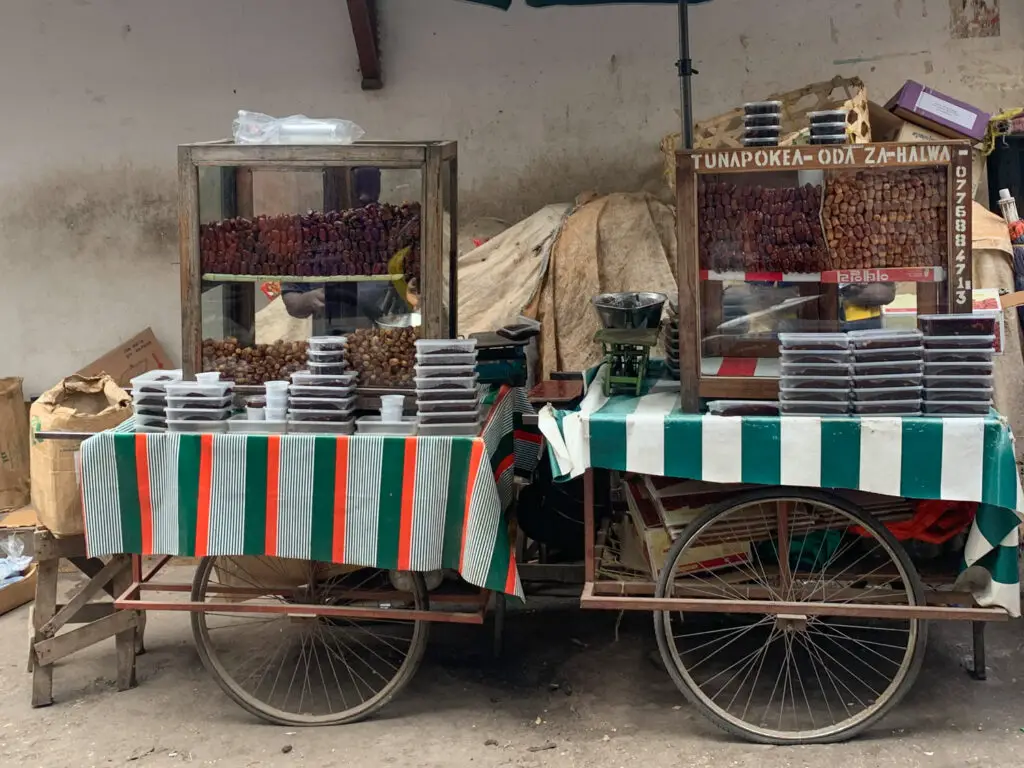
Date palms are grown all over Zanzibar and the popularity of this fruit is evident in its availability. In particular, there is a section of Stone Town market where at least a dozen vendors are vying for trade. We always kept dates with us as they are the perfect sweet snack.
Oranges
Zanzibar is renowned for its fresh, fragrant oranges. The island’s warm climate provides the perfect growing conditions, and farmers produce a bounty of juicy, sweet oranges every year, which are quickly turned into a perfect breakfast delicacy.
Zanzibar Fruits Conclusion
Visiting Zanzibar, also known as Spice Island, gives you so much to see and experience. Not only are the beaches and nightlife breathtaking, but there is also the chance to visit a spice farm and treat yourself to the vibrant and refreshing taste of local Zanzibar fruits.
Related
- 19 African Fruits You Need to Try
- Maasai Food – Cow’s Blood to Ugali
- 12 Unique Fruits that start with U
- 17 Tropical Fruits You Need to Try
- African Pear: The Unique African Fruit
- Fruit that starts with T
- Lychee Juice
FAQ
The spice plantation in Zanzibar is renowned worldwide for its unique, pungent spice mixes and exquisite aromas. Strolling through the plantations is a sensory journey, as vibrant cardamom, cinnamon, and nutmeg trees fill the air with their fragrances.
You’ll be met by friendly locals who will guide you through the different spice walks taking you through each season and its associated spice mix creation. Taking home some of these precious mixtures is like bringing back a little piece of Zanzibar – memories that will last forever, or at least until the spices have been used up.

